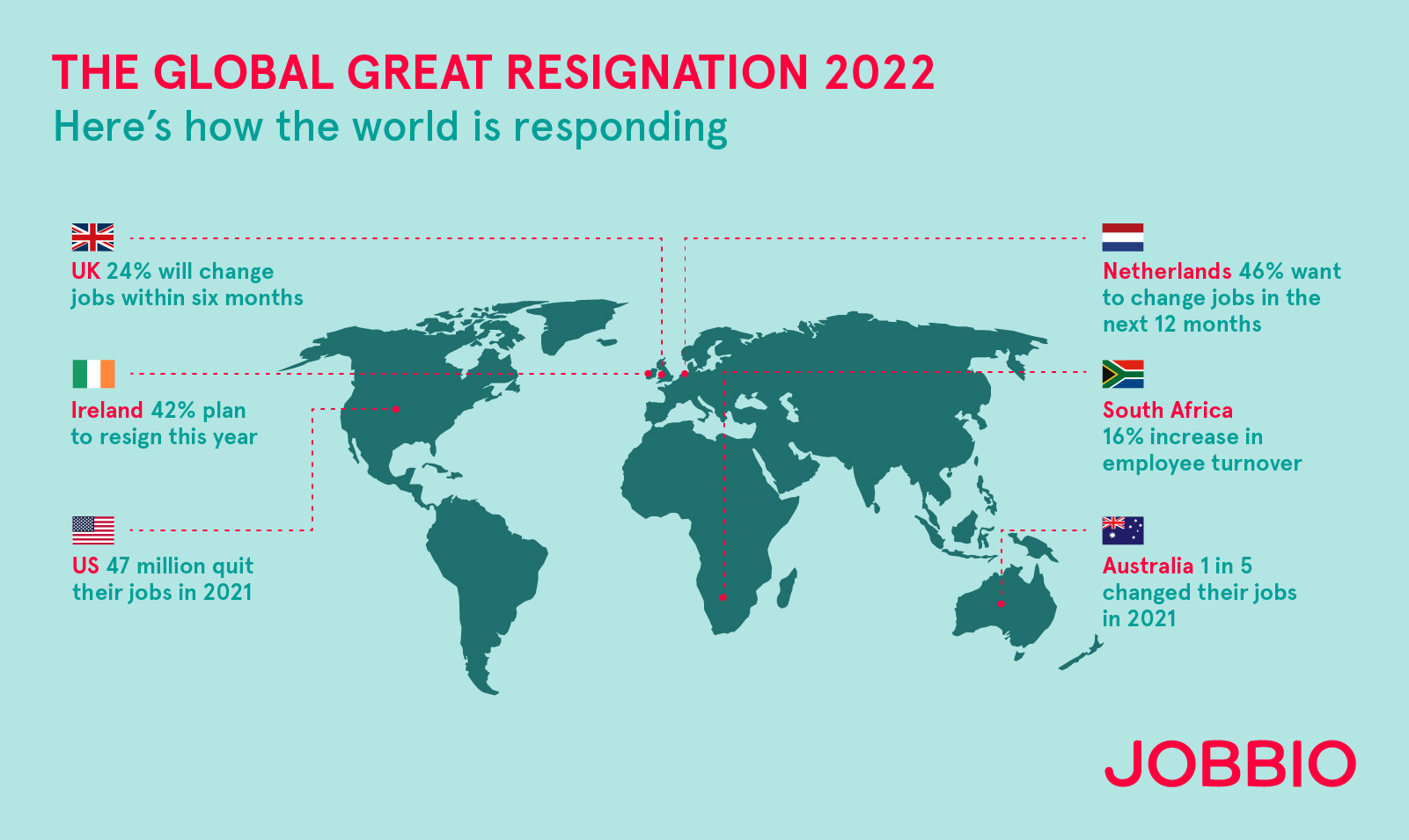We’re sure you’ve heard of the Great Resignation, or as it has otherwise been called, the Great Reset. Whatever name you’re giving it, the original term was coined in late 2020 by Anthony Klotz, an associate professor at Texas A&M University, in response to millions of American workers quitting their jobs in the wake of the Covid-19 pandemic.
Things were a little different in Europe thanks to policy-led decisions by EU governments to use job retention schemes, which helped keep the bloc’s unemployment rate lower than it would have been without intervention, and kept around four million workers in their jobs, according to the IMF.
 Ireland is no different to the rest of the world when it comes to resetting what we want from our work, with similar sentiments reported in the UK, US, South Africa, the Netherlands and Australia*
Ireland is no different to the rest of the world when it comes to resetting what we want from our work, with similar sentiments reported in the UK, US, South Africa, the Netherlands and Australia*
But there are other factors that have made us long for change and are influencing movement within job markets. We’re now in an environment where we’re not looking for a job for life, but a job for “my life”. Many of us now want to do work that supports our personal goals for better benefits, compensation and way of working, whether that’s hybrid, remote, or a mix.
This is prompting people to want to work for companies where those values will be matched. At the University of Limerick’s Kemmy Business School WorkFutures Lab, a new survey of 1,000 Irish employees has discovered that about 40% either agree or strongly agree that ‘my future career lies outside of this organisation’, regardless of industry.
Are you ready to start on your own great resignation? Here’s what you need to consider…
 What’s your ‘worth it’ equation?
What’s your ‘worth it’ equation?
When frustrations arise at work it’s often tempting to want to pack up and go elsewhere. But issues such as a better hybrid working mix or a bump in compensation can often be addressed by asking for a conversation with your manager, so ask for a meeting and make your case.
However, not all jobs are worth saving. Consider the promotion path available; are there continual learning and mentoring opportunities available, and how engaged is management around the issues that matter to you, such as diversity and inclusion? If you feel you’re not progressing, not learning and your values aren’t aligning, it’s time to make a move.
Plenty of people are doing the same. Recent research from Microsoft found that 47% of its survey respondents said they are now more likely to put family and personal life over work than before the pandemic. But before you do call time, it’s worth noting that another recent survey of 2,500 workers found that 72% experienced what’s being called “shift shock”, where a new role or new employer was not what was expected. Additionally, almost half of these workers said they’d look to get their old job back if they could.
Decide what’s next
You already know what’s making you unhappy at your current job, so use this to inform yourself about your next role. If you’ve been held back from promotion or you feel you haven’t been able to progress professionally, then make this a priority.
Perhaps you’d like more flexibility in your hours or extra days working from home. Additional holiday days, or better (or any!) healthcare are important considerations too. And be wary of confusing perks for real, tangible benefits. Pizza parties and in-office pool tables are all well and good but an annual contribution towards your professional development would be much more beneficial to your career in the long run.
Pizza parties and in-office pool tables are all well and good but an annual contribution towards your professional development would be much more beneficial to your career in the long run
Financial incentives and benefits aside, will a new role allow you to learn new skills, challenge yourself, and continue to advance your career? Moving from one similar job to another can be a bit of a trap. 33% of job hunters say their reason for looking is boredom and the need for new challenges – so you don’t want to end up going through the hob hunting rigmarole all over again in 12 months time.
 Refine your skillset
Refine your skillset
Okay, you’ve definitely decided to move jobs. What’s next? A good look at your skills is essential. Split them into hard and soft skills: your soft skills will be things like your ability to communicate and listen, work in a team, manage problems and solve them creatively or with critical thinking.
Harder skills then, are things such as language ability, computer skills, certifications you may hold as well as specific skills related to the industry you’re in – for example SEO optimisation or coding.
Increasingly though, it is a hybrid skills mix that is attracting employers.
Increasingly though, it is a hybrid skills mix that is attracting employers. Database analysis of almost 1 billion past and current job ads has discovered that one-in-four jobs now show signs of hybridisation, and one-in-eight positions are highly hybridised as employers move towards candidates who can do more than one thing. For example, previously purely technical jobs may now require people with presentation and team-building skills. Or a formerly people-oriented role may now require candidates to hold some technical skills.
Optimise your CV
It’s entirely likely you haven’t so much as glanced at your CV since the last time you ran it through Word before sending it off. Firstly, make sure you update your skills, as above. Take a look at your work experience and edit accordingly for the role you’re applying for, spell check it thoroughly and it is also vital to ensure that your contact details are up-to-date.
Lastly, something that often trips people up is not optimising for applicant tracking systems (ATS), or software which recruiters and employers use. Place keywords relevant to the role you’re applying for within the content of your resume to make sure it gets seen. Now, you’re ready to go.











